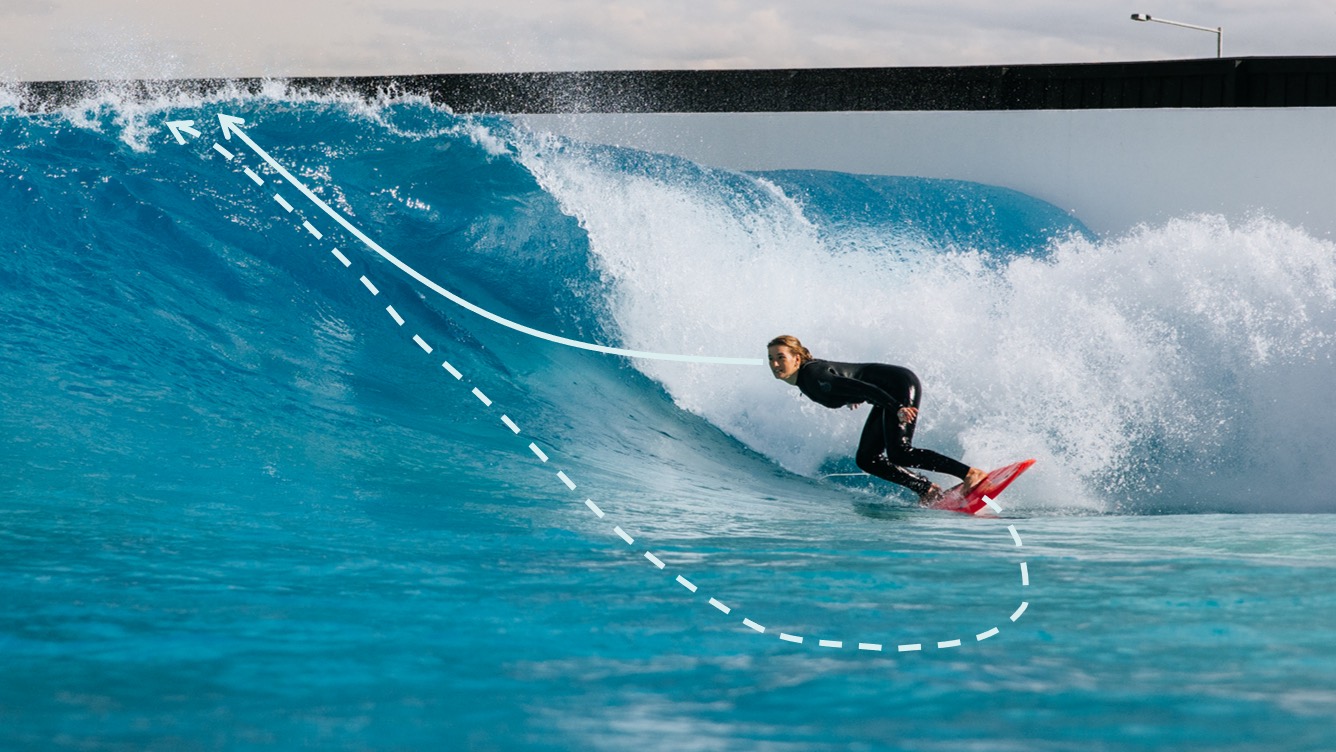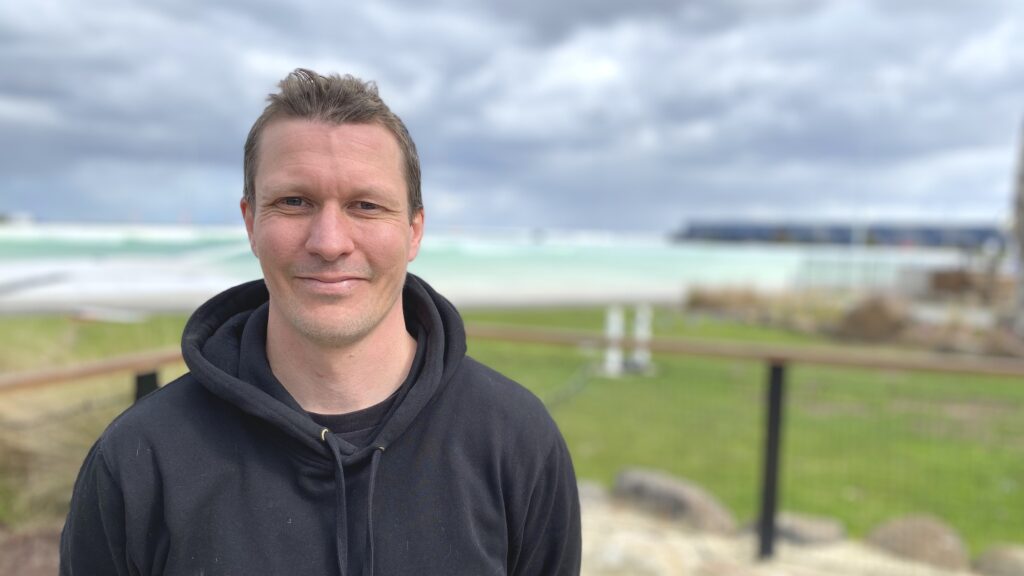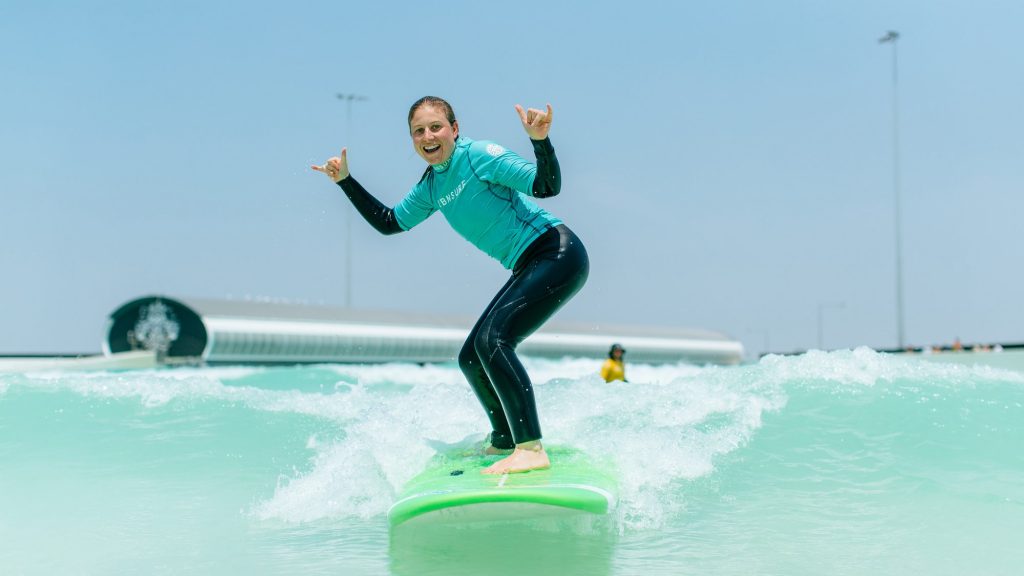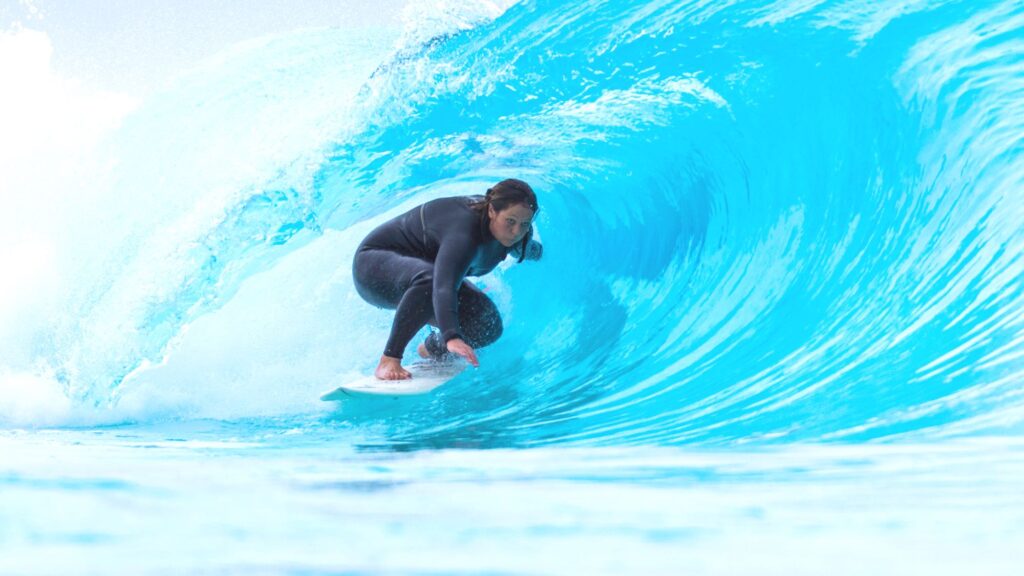Melbourne’s surf coach on why you need 35 different coaching products at a wave pool

Australia is head and shoulders above many countries when it comes to organizing and promoting sport. Each state has its own full-time surfing institution to run contests, safety courses and coaching programs. To many, Australia is a lesson in what to do to succeed in sport. So it makes sense that the country’s first public surf park would draw on the hard-won experiences of institutions like Surfing Australia and Surfing Victoria to develop coaching programs.
URBNSURF has implemented tools borrowed from the national level to help individual surfers improve while enjoying the surf park – whether that’s learning to pop-up or to nail a slob-grab air.
Sam Coleman is the affable Surf Academy Manager at Urban Surf Melbourne and has spent years refining the coaching process. During WavePoolMag’s most recent visit we sat down with Sam to explore the differences between salted coaching programs and those born in wave pools. The takeaway? we were floored at how much detail and thought goes into the process at URBNSURF.

And what are your job duties as surf academy manager?
The first priority has been to work with our high performance partners like Surfing Victoria and Surfing Australia to develop our progression pathway. And now we can take lessons and coaching and optimize for groups of people that we have coming through that have never really had access to coaching before in this sort of space. That’s the first priority. And then essentially, the design and implementation of those products and services and managing and leading the people that are going to run those services. I’ve got about 40 odd casual coaching staff, some senior coaches and coordinating staff. And so ultimately there’s a lot of R&D and co-design involved in really working out what is needed out there and then implementing those things.
Tell us about developing your program, how did you just take the model from Surfing Victoria and drop it in the wave pool?
No. It’s different for a surf park. Prior to this, you were either picked as a young grommet, age eight and just groomed and taken through the high performance pathways that are offered through something like Surfing Victoria, which is our local state governing body. Or you went through a surf club and were involved in life saving. Or you are just a free surfer that would go down on the weekend or, you know, that was your thing. So you kind of missed out on that coaching opportunity. And we’ve sort of found that there was so much of our core group that were getting golf coaching and they were getting football coaching, and they were getting exposure to high performance business coaching, but had never sought out any technical support in their surfing. And nor was there a really defined pathway to go from beginner through to advanced in a space where we could also have so much control over the elements that are impacting that progression.

So who gets coaching at URBNSURF?
I guess we have a really broad range of people. We have people who are coming in and just doing the beginner surf in the Bay, hoping just to get their first exposure or putting on a wetsuit and doing it in a nice, safe environment where they can see the floor and not be worried about any wild life biting or touching them. School groups and people that are in an urban space. We’re an hour and 15 minutes from a really good surf beach. So we’ve got access to school kids that maybe haven’t had the chance to be around the beach. So we run water safety programs, learn how to float safely, how to identify and navigate rips in a controlled environment. So there’s that kind of element, the families that are coming for their Melbourne experience, being next to the airport, come here and do that as an exposure to that. And then we have our local groups that are coming and doing this progression pathway where we’ve sort of been able to go from day one.
And now we have over 35 different products that take you right up to advanced sessions and barrel sessions and we have our surf skate lessons and our video analysis products with the online content. And those are just, we’re building different pillars of information of support that. We start with a needs assessment on the person that’s coming through and going, ‘do you need an intensive course? Is it just a touch up on a few technical elements, or are you wanting to come here every week and progress?’ And so, essentially there’s those people that are coming with us and doing private lessons or casual lessons or we have a five week program that essentially is theme driven. So that you can come into it at any level and get a different thing out of it. And that’s really important because we know that surfing is a lifelong journey. And you don’t just learn to cut back and then you’re done. There’s boards and waves and all sorts of different things that come into play with how you might need to challenge that.
Within the framework of URBNSURF, you have certain product offerings?
Yes, correct. It’s about really educating people about what is the best way to progress as an adult. And that’s a large portion of this group – people that want a reliable, sure thing, a guarantee. Say they’ve got a window between 5 p.m. and 6:30 p.m. before they have to get back to put dinner on the table and take the kids to do something else. So they want to be really sure that they can get in some waves. But they’ve never been exposed to what it looks like to actually progress in the surfing realm. It’s all been ‘watch that competition, or watch that guy over there and follow him.’ But no feedback either from a video point of view or really technical understanding of the science of surfing, the science of the way the board is made and the way the waves are made. And then getting feedback on that.
So you’re doing one-on-one coaching?
We do one-on-one coaching. We also do small group coaching. You’ve got the very large groups and that’s more like those school groups, etc.. And then you have more of the casual group that’s coming in, and it might be six people at the Point. Then you’ll have the private coaching, which is that one-on-one, whether it’s in the Bay or at the Point. And then you’ve got that five week program where you’re having the same coach, the same group around you. There’s a social connection that comes to that. You can drip feed the information. So it’s not so much like an influx of info all at once.
How do you watch someone’s surfing to critique it? Are you out on the Point? Are you using Flowstate video services?
Yeah, all of the above. So, it changes as you go through that learning pathway in terms of what you need and what you’re really going to benefit from. But the whole methodology that we developed around this is very much about needs-based support. It’s about a connection and a development of trust and rapport and safety that you need in coaching. And sometimes that starts with more of an information delivery sort of model, more of a teaching thing when you’re just need to you’ve never touched the board, you’ve never put on a wetsuit, you don’t know where to walk or hold and all that sort of stuff. Much more of a teaching sort of concept. I’m needing to be right close to you. I’m pushing you in. I’m showing you where the take off position is. And then you’re giving them more and more independence as you go up the pathway in terms of their skill level and development. And it becomes more about, I can give you more distance and maybe I’m giving you a different perspective and maybe I’m doing some video now, or maybe we’re doing some review, maybe there’s an online component, maybe there’s some self learning that we’re wanting to combine together. And utilizing these other tools, whether it is things like surf skate or it is doing some video analysis or it’s using the footage that we’ve got there, or it’s some physical mind body breathing techniques, etc.
So there’s a lot of methodology that we’ve built around, not just the technique, because there’s an abundance of information, it’s more about how do you actually apply that to me? And the I guess the art form of coaching and true coaching is non-content specific. It’s a great coach who’s able to connect to you and listen to you and really go on a bit of a journey with you in terms of going, ‘how do I take you from wherever you are now to wherever you want to be?’ And so we’ve focused a lot of our attention and our coaching on really optimizing that capability of the team to ask the ‘why’ and the purpose and give people autonomy and give people that concept of mastery and that needs to be done in a really bespoke way.

So you have your tool kit and you choose the thing that works.
And that’s the thing. Partnering up with those really high performance coaching teams like at Surfing Vic who are coaching Ethan Ewing and they’re coaching Tyler Wright. And they’re coaching these guys that are the best in the world. So we know that the content is the best it can be. But then, well, I’m not coaching Tyler every day out here I’m coaching you. And you might need something very different to what Tyler needs. But it’s really about how do I make a needs assessment that makes someone feel safe enough to do what they want to do?
And what is the most rewarding part of your job, Sam? What do you love about it?
You know, I think everyone I speak to here, I tend to say there’s two parts. If I can have two. The first part I think is it’s phenomenal to be in a workplace where people are coming from all sorts of backgrounds. I’ve got engineers and architects and nurses and teachers and students that are working for me. All these amazing backgrounds in the world out there. But they come here and they have a passion for surfing and that’s the connection as opposed to you might work as a physio and two people in the office connect around the water cooler and like surfing. It’s flipped here. There’s just an amazing vibe and culture that’s created by that, which is really interesting. But the other part is kind of just that memory that you have of your first wave and the joy and the elation that you get to re-experience every time that people walk in the door of the academy. It’s just phenomenal seeing the six year old kid and the 76 year old kid walk through my door and just smile.
Related Coverage
